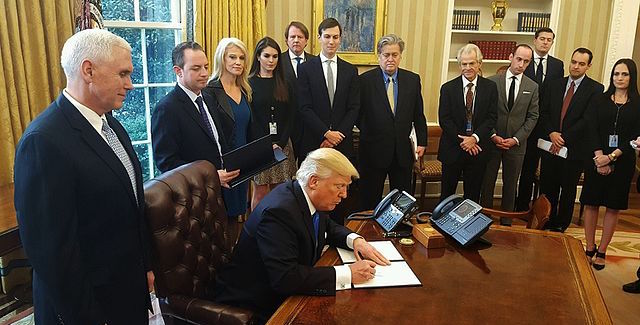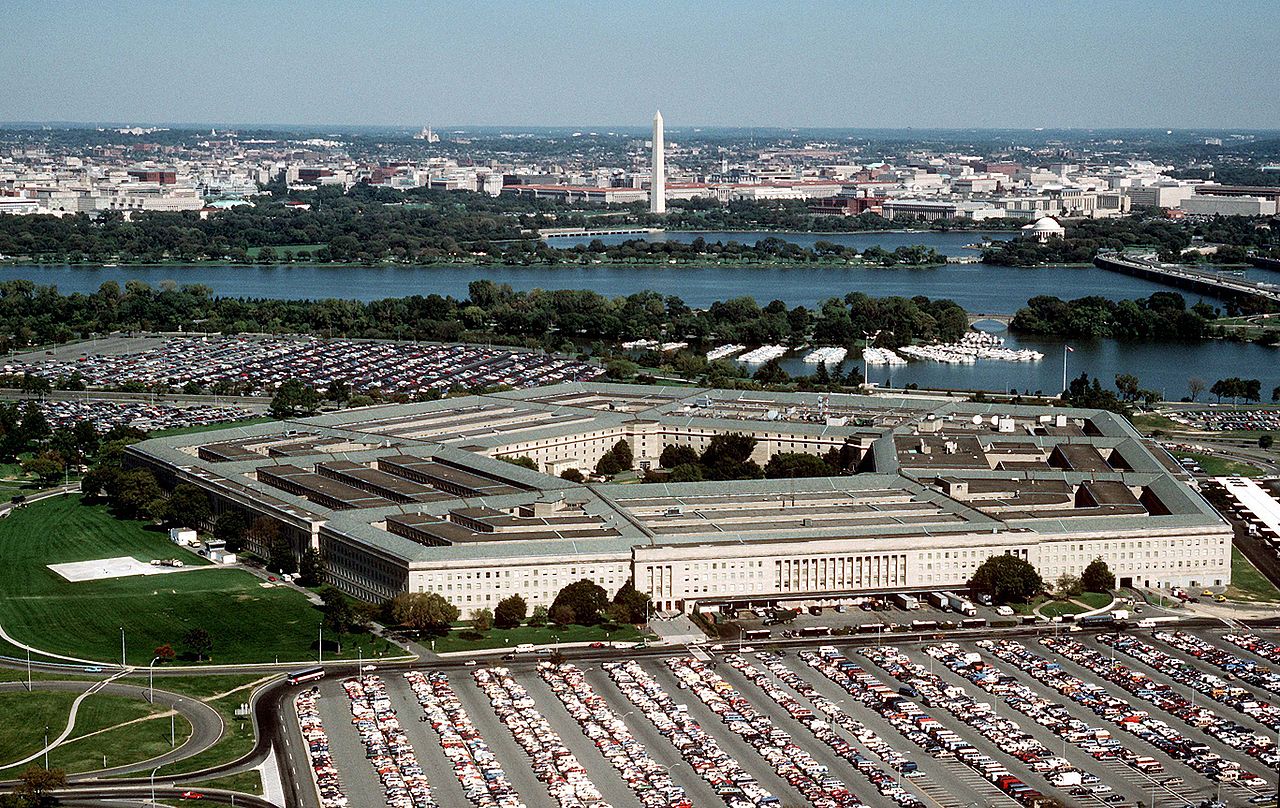The Yates Testimony and the White House Counsel
Sally Yates’s testimony yesterday calls into yet greater doubt the effectiveness of White House Counsel Don McGahn.

Published by The Lawfare Institute
in Cooperation With

Sally Yates’s testimony yesterday calls into yet greater doubt the effectiveness of White House Counsel Don McGahn. I want to emphasize up front what I have said in each of my critical posts on McGahn: He has an extremely difficult client, and it is sometimes hard to know whether the White House screw-ups that would normally be attributed to the White House Counsel should in fact be attributed to the Counsel’s difficulties in keeping a norm-breaking, truth-challenged president in line. But the evidence seems strong that McGahn has exercised bad judgment during his brief tenure as White House Counsel. Yates added to that evidence yesterday.
Rather than relisting McGahn’s sins as White House Counsel (which I have outlined here, here, here and here), I will limit myself to his dealings with former National Security Advisor Michael Flynn, which is what Yates discussed yesterday. This in a nutshell is some of what we knew before yesterday:
-
In March, Flynn registered as a foreign agent under the Foreign Agents Registration Act for actions as “an agent of a foreign principal” that his firm took the previous year and for which he should have registered the previous year. According to the Washington Post, Flynn’s attorneys told McGahn during the transition “that Flynn might need to register with the government as a foreign agent.” The White House then said that McGahn was unaware of the details of Flynn's work but did advise him that his personal lawyer should determine whether registration was appropriate. It was later reported that Flynn’s attorneys had further discussions with an unnamed White House attorney about the matter after the inauguration. As I wrote about this matter: “It was incumbent on McGahn, who knew about Flynn’s foreign agent issue, to raise the issue with Flynn, to uncover all of the facts, and to counsel Flynn on whether and how he might resolve the issue before he assumed his very important White House post on January 20. McGahn failed in all of these duties.”
-
Before yesterday we knew that Yates informed McGahn in late January that Flynn had misled senior administration officials about his phone conversation with Russian Ambassador Sergey Kislyak. We also knew, from Sean Spicer, that McGahn reviewed the Flynn matter after he spoke with Yates and “determined that there is not a legal issue” and “corroborated” the President’s instinctual view that Flynn “did not do anything wrong.” Assuming this was an accurate representation of McGahn’s determinations, I wondered at the time how McGahn possibly could have reached this conclusion since he lacked all the facts and since the legality issue wasn’t his to make in any event—it was DOJ’s call. As I argued at the time, “Even if McGahn strongly believed that Flynn was innocent, it would have been deeply imprudent to act on that belief in advising the President when there was an ongoing investigation focused squarely on the National Security Advisor and the White House more generally.” I added that it seemed like a “big mistake” for McGahn to conclude that Flynn’s actions did not raise a legal issue “when there is an ongoing FBI investigation centered on the White House that the White House Counsel could not have known everything about.”
After Yates’s testimony, we now know much more about what she told McGahn. She “took him through in a fair amount of detail of the underlying conduct, what General Flynn had done, and then we walked through the various press accounts and how it had been falsely reported.” She described this conduct to McGahn as “problematic in and of itself.” She also expressed the Department’s belief that “the vice president and others were entitled to know that the information that they were conveying to the American people wasn't true.” She emphasized that the DOJ and intelligence community were not the only ones who knew about Flynn’s lies to the Vice President. The Russians did as well and likely had proof, and that created “a compromise situation, a situation where the national security adviser essentially could be blackmailed by the Russians.” And finally, she told McGahn that the FBI had interviewed Flynn in the White House.
Especially coming against the background of knowing (and apparently doing nothing) about Flynn’s failure to report his foreign agent work, the information Yates conveyed should have set off loud alarm bells. Yates and the Justice Department clearly viewed the matter—a National Security Advisor who misled the Vice President and the American people about his Russian contacts and “was compromised with respect to the Russians”—as extremely serious and urgent.
After receiving this information from Yates, McGahn called Yates back to the White House the next day to raise four topics:
The first topic in the second meeting was essentially why does it matter to DOJ if one White House official lies to another. The second topic related to the applicability of criminal statutes and the likelihood that the Department of Justice would pursue a criminal case. The third topic was his concern that their taking action might interfere with an investigation of Mr. Flynn. And the fourth topic was his request to see the underlying evidence.
The first question is puzzling on many levels. Why would the White House Counsel ask DOJ whether it mattered if the National Security Advisor lied to the Vice-President and others? Did he not understand or care about what Yates had told him the day before—that DOJ thought Flynn had badly misled the American people and was compromised by the Russians? (Yates re-emphasized in response to the question that DOJ’s concerns involved “a whole lot more” than mere lies). Why did he think this was a serious question to ask in these circumstances? Was he trying to get a clearer official answer for his superiors? Why? It’s really hard to fathom why he asked this. As for the other questions: Yates refused to answer the second question, which should have led McGahn to assume (and act on the assumption) that the DOJ was pursuing a criminal case. On the third, she informed McGahn that any White House action against Flynn would not interfere with the investigation (and indeed the DOJ seemed to invite WH action). And on the fourth, DOJ eventually provided access to the underlying evidence.
Yates was careful yesterday not to toss McGahn under the bus, and noted that “Mr. McGahn certainly demonstrated that he understood that this was serious.” But did he respond to the information she gave him in a serious fashion? A serious response by the White House Counsel would have involved not just an immediate discussion with the President about whether Flynn could stay on as National Security Advisor, but also an immediate, thorough review of the impact of the revelations on the NSC, and the NSC’s handling of classified information, and Flynn’s access to that information. McGahn should have been concerned about protecting the President and U.S. national security. And yet Flynn participated the next day in an hour-long call with Putin and lasted in the job for two more weeks, and there has been no suggestion to date that any such intensive review took place.
It remains possible that McGahn advised the President to do a more searching review and to take more precautions, and the President shot him down. But that is not what Sean Spicer said. Spicer said that McGahn did something approaching the opposite: McGahn apparently concluded that “there is not a legal issue” concerning Flynn, that the President’s instincts that Flynn “did not do anything wrong” were correct, and that the whole matter raised merely a trust issue. These conclusions were (as I argued in February) hard to defend even before we knew about what Yates told McGahn. But now that we know that Yates told him that that Flynn had lied and was compromised by the Russians and was under investigation by the FBI, these reactions are, I believe, indefensible. To repeat: The legality of Flynn’s actions was not McGahn’s call to make, and if McGahn were properly carrying out his responsibilities to ensure lawful action in the White House and to minimize law-related political damage to the President, he would have acted differently. And more broadly, McGahn (along with the President’s Chief of Staff) should have foreseen how the Flynn matter would do serious harm to the presidency and taken steps to avoid that.
Several conservative friends have chastised me for being too hard on McGahn (whom I don’t know, by the way). One friend asked me to lay off of McGahn on the ground that he had a horrible client, he was doing his best, and in any event, and most importantly, he was doing a great job in selecting conservative judges. McGahn has been an important player in Trump’s Supreme Court and lower court judicial selections, and for that he deserves great credit since those picks have been terrific. As much as I like the White House judicial appointments, however, I am not so sure the trade-off is worth it for conservatives (any more than I am confident that many other Republican Party compromises for the Trump presidency are worth it). Nor do I understand why a more competent White House Counsel could not be just as solid in listening to Leonard Leo on judges. But however the tradeoff cashes out, McGahn appears to have done a bad job on the law-compliance and ethics-compliance and political prudence side of his responsibilities. The costs of this bad job are not small. Now more than ever, the White House is going to be embroiled in an ever-growing investigation about how it could have selected a National Security Advisor whom it knew had legal problems coming into the job and who ended up in a position where the Justice Department thought he had been compromised by the Russians. And the opportunity costs of dealing with the investigation will be large, since the investigation will hamper the White House and make it harder to achieve its agenda items.
Again: Perhaps McGahn informed the President of these risks at every point and the President told him not to worry about it. Or perhaps the President has shut out McGahn. These things are not what the evidence thus far suggests, but this might be the story that eventually emerges. It also might be that McGahn’s errors of judgment are attributable in part to the chaotic days of the transition and the first few days of the new Administration. Perhaps he has learned the dangers of the early corner-cutting, and that he will be more careful and prudent going forward. I doubt that is so, but I hope it is so.




